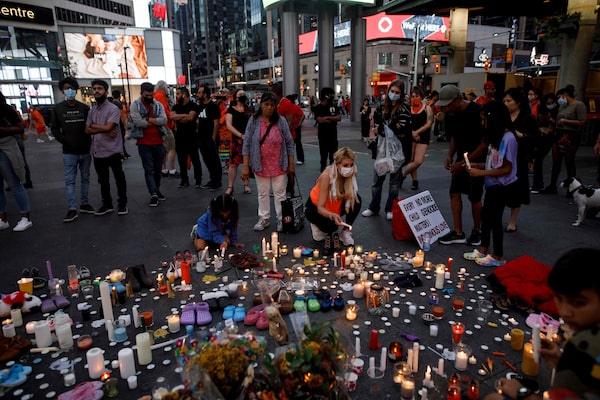
People lay flowers, candles, and shoes at an impromptu vigil as part of "No Pride in Genocide" event in Toronto, Ontario, Canada, July 1, 2021, to encourage reflection on Canada's treatment of indigenous people following the discovery of unmarked graves at residential schools in Canada.COLE BURSTON/AFP/Getty Images
Canadians are nearly twice as likely to say reconciliation between Indigenous and non-Indigenous people is important to them, rather than not important, in terms of influencing their vote, according to a new poll by Nanos Research commissioned by the Globe and Mail.
The poll found that 52 per cent of Canadians viewed reconciliation with Indigenous peoples as important to them in terms of determining how they cast their ballot, while 27 per cent viewed the issue as not important, 18 per cent said they were neutral and 2 per cent were unsure.
Women also rated the importance of reconciliation higher than men.
Nik Nanos, the founder and chief data scientist of Nanos Research, said in an interview on Friday that the survey shows that the recent discovery of unmarked graves of former residential school students has struck a chord with many Canadians who are concerned about reconciliation.
Beginning in June, First Nations have announced the location of unmarked gravesites near former residential schools. Discussion of what took place at the institutions, including the number of children who died while attending them and abuses they suffered, has since taken on a new level of intensity following the announcements.
Some communities have said the graves may belong to children who died at the schools, which operated for more than 120 years in Canada and were run by churches and funded by the federal government. In 2015, the Truth and Reconciliation Commission, which spent six years studying the effects of residential schools in Canada, deemed that what happened at the institutions constituted cultural genocide.
The release of the Nanos Research survey is also taking place at a time when opposition parties anticipate that Prime Minister Justin Trudeau is going to trigger an election in the coming days.
While Mr. Trudeau has said he is focused on supporting Canadians through the pandemic, there is intense planning taking place behind the scenes by political parties who largely expect the Prime Minister to visit the Governor-General soon to advise the dissolution of Parliament to pave the way for an election.
Opposition parties have expressed dismay at the prospect of an election being called while the pandemic is a continuing concern, including a fourth wave of the virus.
Issues such as jobs, the economy and the pandemic remain extremely important issues in a forthcoming campaign, Mr. Nanos said. But he said the research indicates that reconciliation is a potential election issue and many want to hear answers from all political parties on the path forward.
“I think it would be fair to say they probably want to hear about it during the debate, they want to know where all the party leaders stand on a path forward,” Mr. Nanos said. “In my experience, in the past 20 years, Indigenous issues are not usually an issue during the course of a campaign.”
Nanos conducted a hybrid telephone and online survey of 1,002 Canadians, 18 years of age or older, between July 30 and Aug. 2 as part of an omnibus survey. Participants were randomly recruited by telephone using live agents and administered a survey online. The sample included both land- and cell-lines across Canada. The margin of error for the survey is plus or minus 3.1 percentage points, 19 times out of 20.
Know what is happening in the halls of power with the day’s top political headlines and commentary as selected by Globe editors (subscribers only). Sign up today.